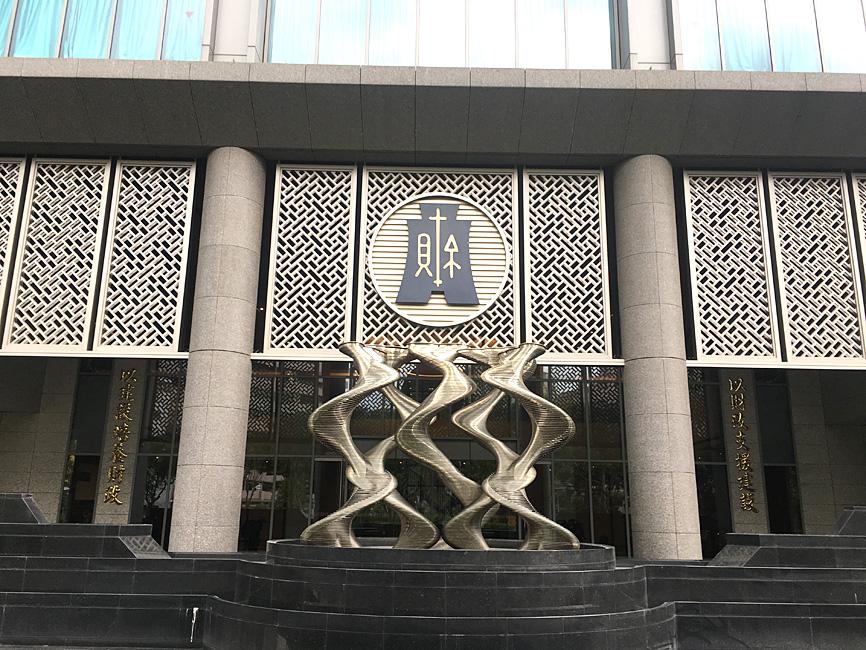The nation’s tax revenue last month jumped 22 percent year-on-year to NT$692.3 billion (US$23.08 billion), due to substantial gains in revenue generated from corporate and personal income taxes which more than offset retreats in revenue received from commodity tax, as well as stock and property transaction taxes, the Ministry of Finance said yesterday.
Corporate income tax revenue spiked 36.6 percent annually to NT$315 billion, as major Taiwanese companies reported an increase in earnings, the ministry said.
Similarly, personal income tax revenue soared 37.6 percent to NT$214.7 billion, thanks to wage increases, the distribution of cash dividends by local listed firms and capital gains attributable to property transactions, Department of Statistics Deputy Director-General Chen Yu-feng (陳玉豐) said.

Photo: Clare Cheng, Taipei Times
By contrast, securities transaction tax revenue, a key tax revenue driver in the past two years, plunged 58.3 percent annually to NT$14.2 billion, after daily stock turnover shrank from NT$652.3 billion to NT$271.3 billion, Chen said.
The stock market rout induced by global monetary tightening and economic uncertainty drove investors to the sidelines, analysts said.
The year-on-year decline in securities transaction tax revenue is likely to persist throughout this year, in the absence of liquidity-backed rallies.
Revenue from land value tax stood at NT$6.4 billion, slumping 29.9 percent from the same period a year earlier, as taxable cases fell 7.5 percent to 42,062 deals, ministry data showed.
At the same time, business tax revenue grew 11.3 percent to NT$97.7 billion, while entertainment tax revenue increased by more than 15-fold to NT$120 million, as people began to resume recreational activities as the COVID-19 situation eased, the ministry said.
In the first seven months of this year, the ministry collected NT$2.95 trillion in tax revenue, up 16.2 percent from the same period last year and ahead of its budget schedule for the year by 23.9 percent.

Stephen Garrett, a 27-year-old graduate student, always thought he would study in China, but first the country’s restrictive COVID-19 policies made it nearly impossible and now he has other concerns. The cost is one deterrent, but Garrett is more worried about restrictions on academic freedom and the personal risk of being stranded in China. He is not alone. Only about 700 American students are studying at Chinese universities, down from a peak of nearly 25,000 a decade ago, while there are nearly 300,000 Chinese students at US schools. Some young Americans are discouraged from investing their time in China by what they see

MAJOR DROP: CEO Tim Cook, who is visiting Hanoi, pledged the firm was committed to Vietnam after its smartphone shipments declined 9.6% annually in the first quarter Apple Inc yesterday said it would increase spending on suppliers in Vietnam, a key production hub, as CEO Tim Cook arrived in the country for a two-day visit. The iPhone maker announced the news in a statement on its Web site, but gave no details of how much it would spend or where the money would go. Cook is expected to meet programmers, content creators and students during his visit, online newspaper VnExpress reported. The visit comes as US President Joe Biden’s administration seeks to ramp up Vietnam’s role in the global tech supply chain to reduce the US’ dependence on China. Images on

New apartments in Taiwan’s major cities are getting smaller, while old apartments are increasingly occupied by older people, many of whom live alone, government data showed. The phenomenon has to do with sharpening unaffordable property prices and an aging population, property brokers said. Apartments with one bedroom that are two years old or older have gained a noticeable presence in the nation’s six special municipalities as well as Hsinchu county and city in the past five years, Evertrust Rehouse Co (永慶房產集團) found, citing data from the government’s real-price transaction platform. In Taipei, apartments with one bedroom accounted for 19 percent of deals last

US CONSCULTANT: The US Department of Commerce’s Ursula Burns is a rarely seen US government consultant to be put forward to sit on the board, nominated as an independent director Taiwan Semiconductor Manufacturing Co (TSMC, 台積電), the world’s largest contract chipmaker, yesterday nominated 10 candidates for its new board of directors, including Ursula Burns from the US Department of Commerce. It is rare that TSMC has nominated a US government consultant to sit on its board. Burns was nominated as one of seven independent directors. She is vice chair of the department’s Advisory Council on Supply Chain Competitiveness. Burns is to stand for election at TSMC’s annual shareholders’ meeting on June 4 along with the rest of the candidates. TSMC chairman Mark Liu (劉德音) was not on the list after in December last